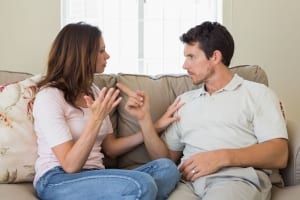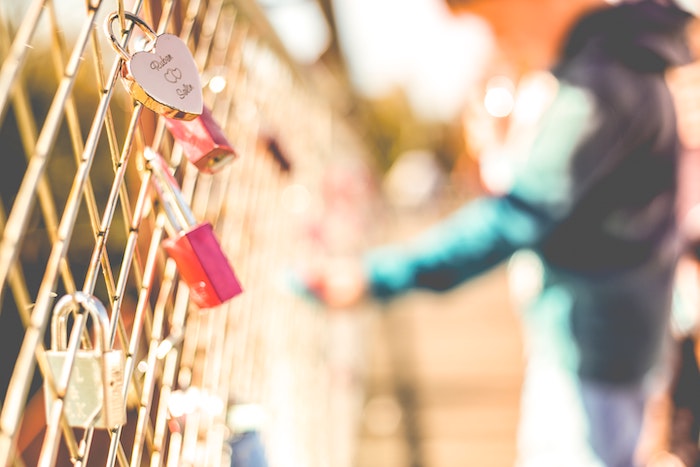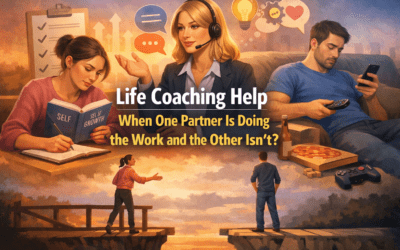Key Moments Of Love Attachment And Detachment
In my first blog I shared, Dr. Susan Johnson’s theory from her book, “Hold Me Tight”, that the level of love attachment in relationships is what makes couples compatible or not.
 Couples can feel compatible for days on end, but when some incident happens all hell breaks loose.
Couples can feel compatible for days on end, but when some incident happens all hell breaks loose.
Why?
Dynamic exchanges between couples evolve so fast and are so heated.
They often don’t understand what’s happening or how they’re reacting the way they do.
Attachment needs and the powerful emotions can show up suddenly.
A benign conversation about something mundane like, “Johnny is watching too much TV” shifts into deep issues of insecurity…
“You’re not listening to me!”
“You’re always working!”
“That’s always what’s most important here -not my feelings.”
“I’m all alone. “
Attachment Alarm
If were feeling basically safe and connected to our partner, this key moment is no big deal.
But if were not sure of our connection, it can evolve into a negative spiral of uncertainty and self doubt.
Psychiatrist and researcher, John Bowlby explains what happens when a person’s attachment alarm goes off…
If we suddenly feel uncertain, vulnerable or perceive a negative shift in our connection, than we create a sense of danger or a threat to the relationship.
The threat can be real or imagined. It’s our perception, not reality, that counts.
Party Scene
 Let’s say a husband sees his wife talking to a handsome man at a party.
Let’s say a husband sees his wife talking to a handsome man at a party.
He could feel insanely jealous…
But calm himself knowing that he is important to her and she is always there for him.
This thought could soothes his unease.
Or
He could get angry and walk over to his wife and make a cutting remark about flirting.
Or
He could tell himself he doesn’t care and go have another drink.
Either of these ways of dealing with his fear – attacking or retreating – will only alienate his wife.
She will feel less connected and less attracted to him.
And that, in turn, will only heighten his primal panic.
Second Key Opportunity
 After the immediate threat has passed, the couple has a chance to reconnect, unless their negative coping strategies kick in.
After the immediate threat has passed, the couple has a chance to reconnect, unless their negative coping strategies kick in.
Later in the evening, when the wife seeks out the husband.
Does he reach out to her and let her see the hurt and fear he felt, when he saw her talking so intimately with another man?
Does he express his emotions in a way that invite her to reassure him or does he attacked her for flirting?
Does he demand they go home and make love or remain silent and withdrawn?
Third Key Opportunity
Can the husband pull his wife aside, take a deep breath, and tell her the truth that he’s having a hard time watching her talk to the handsome stranger?
Or does he just go stand beside her and expresses upset with the trouble?
Suppose the wife senses something is wrong and asked if he is okay. She is accessible and responsive.
But will the husband take it in? Feel comforted, closer?
Or does he instead stay guarded and push her away to avoid feeling so vulnerable?
He even attacked her to test if she “really cares”?
Back To Normal?
 When they go back to their every day life, is he confident that she is there in times of trouble or doubt?
When they go back to their every day life, is he confident that she is there in times of trouble or doubt?
Or does he still feel insecure?
Does he try to control and push her into more and more responses that assure him of her love or does he minimize his need for her?
Men Act Differently Than Women In Relationships
 Man and women share the same attachment needs and fears.
Man and women share the same attachment needs and fears.
But they may express them very differently.
When a relationship is on the rocks, men typically talk about feeling rejected, inadequate and a failure.
Women feel abandoned and disconnected.
When distressed, women will “tend and befriend“ meaning they will reach out more to others when they feel a lack of connection.
Why Marriages Fail
According to a landmark study by Ted Huston of the University of Texas, marriages fail because of the withholding of affection and the lack of emotional response.
It’s not increasing conflict that is the cause.
So when fear and doubt and inevitably enters into the relationship, do we panic and clutch at each other?
Or do we abruptly turn away and head for cover?
We have to shift and respond to each other’s emotions.
In a stable relationship, couples connect and balance each other, so they stay in emotional equilibrium.
Get Help
Need help sorting this out in your relationship? I’d love to help!
Contact me to set up a complimentary clarity session.
Go on to the next article in the series on how to transform your love life by clicking here.






Recent Comments